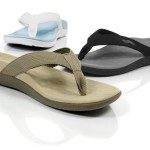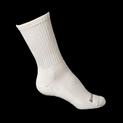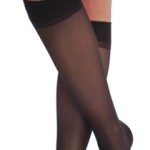Pregnancy and Your Feet
Aching and swollen feet are almost inevitable during pregnancy. Most foot pain associated with pregnancy, however, is easily treated and even prevented. Increased weight, changes in gait and loosening of ligaments due to hormonal changes are all common during pregnancy and contribute to increased force on the feet leading to foot problems.
One of the most common foot conditions brought on by pregnancy is over-pronation (flattening of the feet). Over-pronation can make walking painful and increase strain on the calves, knees, hip and/or back. If the flattening of the feet is left untreated, painful disorders such as Metatarsalgia (ball of foot pain) and Plantar Fasciitis (arch pain), can result.
The condition can be avoided or treated by wearing arch supports and choosing stable shoes. See our recommendations below for proper pregnancy footwear. When you are not in shoes, be sure to opt for sandals or slippers that offer exceptional arch support. To avoid foot pain, you should never go barefoot while you are pregnant any time you are on your feet.
If you are in the Seattle area, contact us for an appointment and we can help you avoid or treat pregnancy related foot and leg pain.
Home Treatments to Prevent Foot and Leg Problems in Pregnancy
If you are not in the Seattle area and want to try home treatments first, you can find our recommended home treatments for pregnancy related foot pain.
Heel Pain in Pregnancy
When you’re pregnant, getting out of bed in the morning is tough enough without adding heel pain to the mix. Morning sickness, exhaustion and even moving around with a bigger tummy and pregnancy weight can be a challenge. If you wake up with heel pain, you may want to just fall back into bed. Heel pain in pregnancy is not normal and can be treated and avoided.
The most likely cause of heel pain in anyone is plantar fasciitis. For pregnant women, the extra weight of carrying a child may make this condition worse adding to the discomfort you already feel. Treatment for heel pain in pregnancy is usually best achieved by supporting the arch of the foot to stop it from flattening and stretching the plantar fascia. The best way to do this is through the use of prefabricated orthotics or custom orthotics to increase support.
The main ligament that runs from the heel to the toes of the foot is called the plantar fascia and in pregnancy, can become stretched due to flattening feet or improper support. This can lead to pain and inflammation. When you sit or lie down for extended periods, this inflammation causes fluid to collect at the bottom of the heel. When you stand, this creates the pain you feel. Gaining weight in pregnancy (which is normal) can worsen this condition.
Foot and Leg Swelling During Pregnancy
During pregnancy women retain fluid and hormones cause dilation of the blood vessels to help carry extra blood for the baby. If there is a family history of vein problems, then this is when valves in veins may start to fail which can lead to varicose veins. In fact, a study published in Swiss Medical Weekly stated that 30 percent of women having their fist baby and 55% of those having a second or third will develop varicose veins. In addition, swelling common in pregnancy leads to foot and leg pain and fatigue.
Wearing compression socks can help keep your feet and legs healthy and comfortable during pregnancy.
Compression Stockings During Pregnancy
Compression stockings are often recommended during pregnancy. They will help circulation and will not harm the fetus. Compression hose reduce that or can slow the process with future pregnancies. We usually recommend 20-30 mmHg strength for the first – second trimester. This is sometimes increased to 30-40mmHg compression at the end of the second to third trimesters.
It is critical to get measured by an experienced fitter and purchase a good quality compression stockings, (Sigvaris or Bauerfeind), as they will be somewhat easier to put on and more comfortable. Inexpensive compression hose have less stretch in them and you will find that you are much less comfortable. In Seattle we usually refer to Mary Catherine’s for fitting for pregnancy compression stockings.
Home Remedies to Treat and Prevent Foot and Leg Pain During Pregnancy
We have put together a ten step plan for women experiencing foot pain during pregnancy. Try these easy home remedies first. If you are not feeling better in a week or two, make an appointment to see us in our Seattle Foot and Ankle Center for more serious treatment to relieve your foot pain. Try the tips below and click here to read other self treatment tips for heel pain.
1. Use arch supports in your shoes.You want ones that provide firm support and conform to your arch. We recommend the FootChair Medical Grade Orthotic. These unique arch supports have an adjustable arch that can be raised to provide maximum support and comfort.
2. For smaller shoes including dress flats and high heels we recommend another model of FootChair, the FootChair Slim Orthotic. This device has a much lower profile and fits into most types of women’s dress shoes. It also flexes in the heel to adapt to different heel heights.
3. When you’re not wearing shoes, wear flip flops or sandals with arch support while on your feet.  Vionic flip-flops and sandals offer exceptional support.
Vionic flip-flops and sandals offer exceptional support.
4. Around the house, use slippers with arch support. Vionic slippers offer the best support we have seen in slippers.
4. Wear seamless socks that do not constrict circulation such as those from  Smoothtoe.
Smoothtoe.
5. To combat foot and leg swelling and fatigue, use compression support hose. We recommend getting a prescription and then a professional fitting. If you cannot do that , then you can try an over-the-counter support hose. A quality one we recommend is Juzo 12mmHg – 20mmHg in thigh-high.
6. When driving for a long period, take regular breaks to stretch the legs and promote circulation.
7. Elevate your feet as often as possible.
 8. Check with a doctor about an exercise program – a walking regimen is usually recommended. Walking on the afflicted foot will actually relieve much of the morning pain, as it acts as a natural massaging action, releasing built up fluids.
8. Check with a doctor about an exercise program – a walking regimen is usually recommended. Walking on the afflicted foot will actually relieve much of the morning pain, as it acts as a natural massaging action, releasing built up fluids.
9. Eat a well-balanced diet and avoid foods high in salt that can cause fluid retention.
10. Icing areas of the foot and leg that are in pain can be effective, as can stretching.
Taking care of your feet allows you to indulge in regular exercise and enjoy a happy and healthy pregnancy. If you have any pain at all that is not relieved by the suggestions above, make an appointment to see us at the Foot and Ankle Center of Washington. We can provide you with conservative treatment options that will relieve your pregnancy foot pain.




